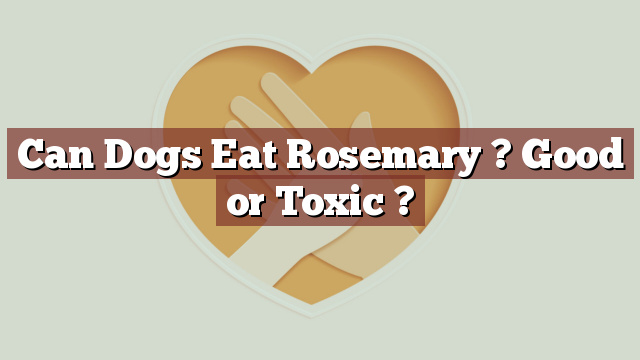Can Dogs Eat Rosemary? Good or Toxic?
Knowing what foods are safe for our furry friends is essential for their overall health and well-being. One such herb that often finds its way into our culinary creations is rosemary. But can dogs safely consume this fragrant herb? Let’s explore the nutritional value of rosemary, its potential risks and benefits, and what to do if your dog happens to munch on it.
Nutritional Value of Rosemary: Vitamins, Minerals, and Antioxidants
Rosemary, a member of the mint family, is not just a flavorful addition to dishes; it also boasts several nutritional benefits. This herb contains a variety of vitamins, including vitamin A, vitamin C, and vitamin B6. Additionally, it provides minerals such as calcium, iron, and potassium. Rosemary is also rich in antioxidants, which help combat harmful free radicals in the body.
Can Dogs Eat Rosemary? Is it Safe or Toxic for Dogs?
Yes, dogs can safely consume rosemary. This herb is generally considered safe for canine consumption. However, as with any new food, it is important to introduce it gradually and in moderation to prevent any potential digestive upset.
While rosemary is safe for dogs, it is worth noting that large quantities may lead to gastrointestinal discomfort. Additionally, excessive consumption of rosemary may cause an allergic reaction in some dogs. Therefore, it is advisable to consult your veterinarian before adding rosemary to your dog’s diet, especially if they have pre-existing health conditions or are on medication.
Potential Risks and Benefits of Feeding Dogs Rosemary
When given in moderation, rosemary can offer various health benefits to dogs. It possesses anti-inflammatory properties that may help alleviate joint pain and inflammation. Additionally, the antioxidants present in rosemary can boost the immune system and promote overall well-being.
However, as with any herb, there are potential risks associated with feeding dogs rosemary. Dogs with gastrointestinal sensitivities may experience digestive issues such as diarrhea or vomiting. Furthermore, certain dogs may be more susceptible to allergic reactions, which can manifest as itching, skin irritation, or respiratory problems.
What to Do if Your Dog Eats Rosemary: Symptoms and Treatment
If your dog accidentally consumes a small amount of rosemary, there is generally no cause for concern. However, if your dog ingests a large quantity or exhibits any unusual symptoms, it is important to seek veterinary assistance.
Symptoms of rosemary toxicity in dogs may include gastrointestinal upset, such as vomiting or diarrhea, increased thirst, excessive drooling, or difficulty breathing. If you notice any of these symptoms, contact your vet immediately.
Conclusion: Rosemary is Safe for Dogs in Moderation
In conclusion, dogs can safely consume rosemary in moderation. This aromatic herb provides valuable vitamins, minerals, and antioxidants that can support your dog’s overall health. However, it is crucial to introduce rosemary gradually and monitor your dog for any adverse reactions. If you have any concerns or your dog experiences unusual symptoms after consuming rosemary, consult your veterinarian for guidance. By making informed decisions about our pets’ diets, we can ensure their well-being and happiness.
Thank you for investing your time in exploring [page_title] on Can-Eat.org. Our goal is to provide readers like you with thorough and reliable information about various dietary topics. Each article, including [page_title], stems from diligent research and a passion for understanding the nuances of our food choices. We believe that knowledge is a vital step towards making informed and healthy decisions. However, while "[page_title]" sheds light on its specific topic, it's crucial to remember that everyone's body reacts differently to foods and dietary changes. What might be beneficial for one person could have different effects on another. Before you consider integrating suggestions or insights from "[page_title]" into your diet, it's always wise to consult with a nutritionist or healthcare professional. Their specialized knowledge ensures that you're making choices best suited to your individual health needs. As you navigate [page_title], be mindful of potential allergies, intolerances, or unique dietary requirements you may have. No singular article can capture the vast diversity of human health, and individualized guidance is invaluable. The content provided in [page_title] serves as a general guide. It is not, by any means, a substitute for personalized medical or nutritional advice. Your health should always be the top priority, and professional guidance is the best path forward. In your journey towards a balanced and nutritious lifestyle, we hope that [page_title] serves as a helpful stepping stone. Remember, informed decisions lead to healthier outcomes. Thank you for trusting Can-Eat.org. Continue exploring, learning, and prioritizing your health. Cheers to a well-informed and healthier future!

